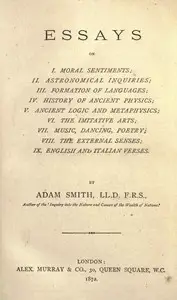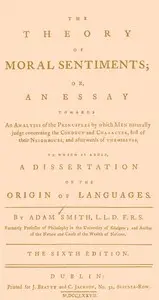"An Inquiry into the Nature and Causes of the Wealth of Nations" by Adam Smith examines the core ideas that contribute to a country's prosperity, written in the late 1700s. It all begins by emphasizing the essential connection between labor and the riches created in a society while exploring how factors like worker production, separation of labor, accumulation of capital, and the impact of government and trade affect economic growth. Smith contends that breaking down labor into specialized tasks significantly boosts productivity, using examples like a pin-making factory to show how dividing work increases output, which leads to better efficiency. The beginning chapters introduce a full look at economic ideas, giving readers a base for figuring out how economic success happens.

An Inquiry into the Nature and Causes of the Wealth of Nations
By Adam Smith
Discover how dividing work, gathering resources, and smart government policies can turn any nation into an economic powerhouse.
Summary
About the AuthorAdam Smith was a Scottish economist and philosopher who was a pioneer in the thinking of political economy and key figure during the Scottish Enlightenment. Seen by some as "The Father of Economics" or "The Father of Capitalism", he wrote two classic works, The Theory of Moral Sentiments (1759) and An Inquiry into the Nature and Causes of the Wealth of Nations (1776). The latter, often abbreviated as The Wealth of Nations, is considered his magnum opus and the first modern work that treats economics as a comprehensive system and as an academic discipline. Smith refuses to explain the distribution of wealth and power in terms of God's will and instead appeals to natural, political, social, economic, legal, environmental and technological factors and the interactions among them. Among other economic theories, the work introduced Smith's idea of absolute advantage.
Adam Smith was a Scottish economist and philosopher who was a pioneer in the thinking of political economy and key figure during the Scottish Enlightenment. Seen by some as "The Father of Economics" or "The Father of Capitalism", he wrote two classic works, The Theory of Moral Sentiments (1759) and An Inquiry into the Nature and Causes of the Wealth of Nations (1776). The latter, often abbreviated as The Wealth of Nations, is considered his magnum opus and the first modern work that treats economics as a comprehensive system and as an academic discipline. Smith refuses to explain the distribution of wealth and power in terms of God's will and instead appeals to natural, political, social, economic, legal, environmental and technological factors and the interactions among them. Among other economic theories, the work introduced Smith's idea of absolute advantage.
















